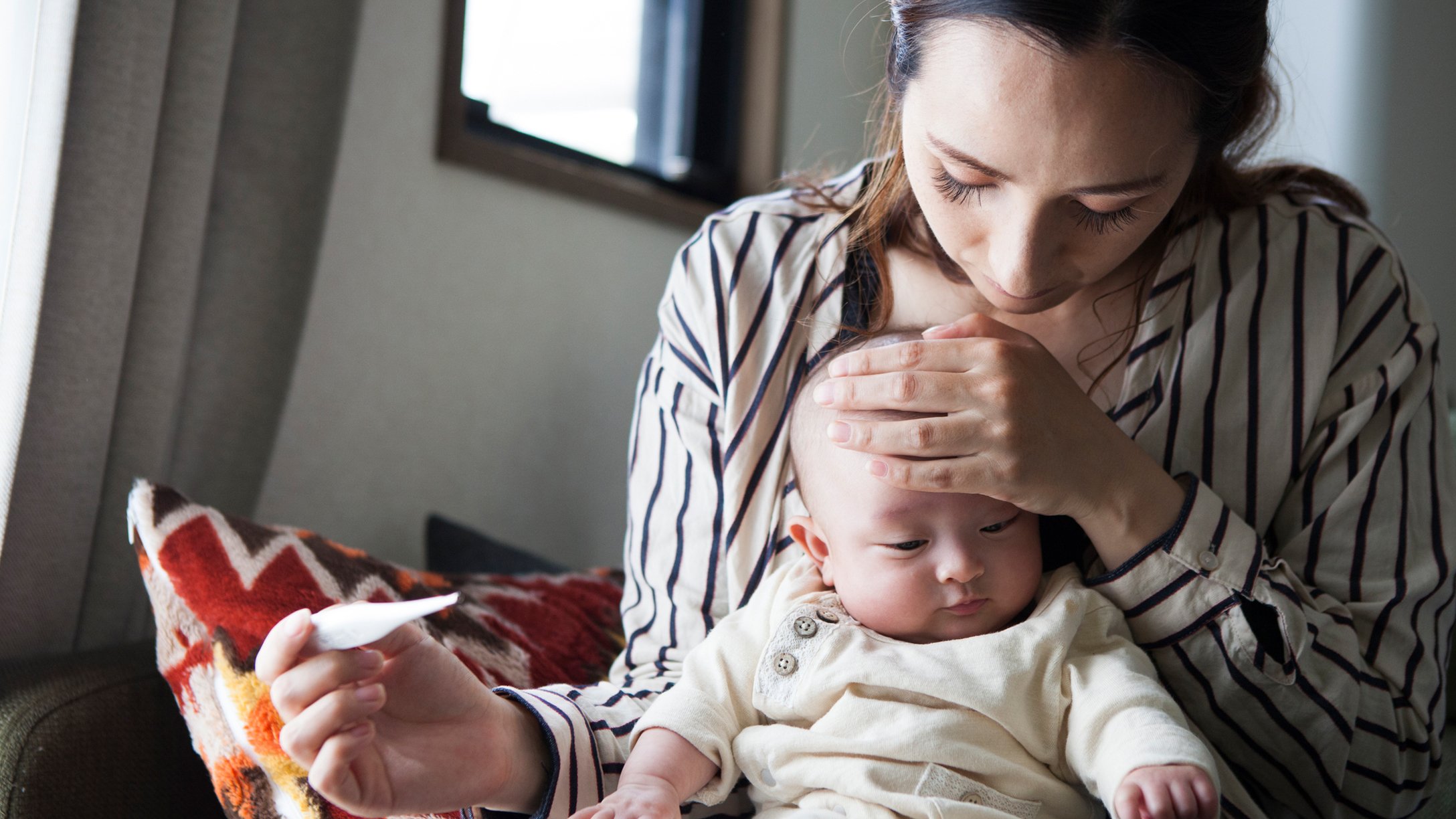
In this article
Newborns under the age of 6 months are not able to get a flu vaccine, making them especially vulnerable to getting the flu and becoming seriously ill. Of course, prevention is the best medicine but it isn’t always possible.
What to do if you think your newborn has been exposed to the flu

Watch for flu symptoms in your newborn baby
The first symptoms of a newborn baby’s flu are often a cough and fever. Your baby may be fussy and or overly tired and lethargic. It is important to keep an eye out for symptoms, especially if your baby was exposed to the flu.
Professor Laura Flinn, of Bradley University’s online nursing program, told Mom.com, “Fevers can be relatively high, so it is important to be diligently checking them and giving the appropriate medication, depending on the infant's age.” Because fevers are so dangerous for newborns, Flinn further recommends, “Rectal thermometers are best for infants, especially those under 6 months.”
Be prepared in public
Just about any public place is a petri dish of germs during flu season. In fact, while taking your newborn in for wellness checkups is important, your medical facility is a prime place to be exposed to other kids and parents who are sick. Our pediatrician had two waiting rooms, one for sick patients and one for healthy ones to try to mitigate the risk, but this isn’t the case with all medical centers or pediatricians’ offices.
Be prepared when you go into public places by having your own stash of hand sanitizer that you can use after using office pens or opening doors. Refrain from reading the magazines or touching any of the toys in the office. While these are probably sanitized at the end of the day, you can’t guarantee they aren’t contaminated.
Even something as simple as not leaning on elevator walls and keeping my son covered in his stroller made me feel more proactive with either of us not coming in contact with the flu bug.
Don’t hesitate to speak up (or leave)
While everyone loves to pinch a newborn’s cheeks, don’t be ashamed to speak up and ask others not to touch your newborn. Remind them that it’s flu season and your baby can’t get a flu shot. Let mama bear come out just a little bit and keep your baby all to yourself when in a room of potentially sick people. If you feel that there is just a little too much coughing going on, feel free to leave.
If you do allow people to hold or touch your baby, be sure to ask them to wash their hands first. This is the No. 1 way to prevent the flu from spreading, and you have every right to ask someone to comply before handing over your vulnerable child. Kisses are a wonderful thing, but don’t let anyone kiss your baby on the mouth. This can quickly expose them to many germs and lead to a serious illness.
When to see a doctor

It’s time to take your newborn baby with the flu to the pediatrician if their fever persists over 101ºF. Other concerning symptoms that require a trip to the doctor include vomiting, diarrhea, chills, fatigue, and lethargic tendencies. A weak cry is symptomatic of weakness in babies.
Remember, you can always make a call to your pediatrician to talk things through before you go in. Making that call is better than waiting it out and letting things get worse. In a newborn baby, flu symptoms may not be easily identified beyond fever and lethargy. Even though newborns can’t get a flu vaccine, your pediatrician can give newborns as young as 2 weeks old oseltamivir (Tamiflu) to reduce the flu’s effects.
Home remedies for flu

Give newborn baby flu patients a lot of liquids. If you are breastfeeding, talk to your pediatrician about supplementing the milk supply with a bottle or even Pedialyte to prevent dehydration. For babies younger than 6 months, talk to your pediatrician about infant acetaminophen or infant ibuprofen to bring down fevers and help with aches from the flu. Do not use aspirin, as it can lead to a life-threatening condition.
Keeping your baby’s fever down is critical when they have the flu. If you are unable to control it with medication, a cool bath will help keep their body temperature down. Newborns are very vulnerable to the complications of flu that could lead to potential death. Stay in contact with your doctor to make sure you don’t need to bring your baby in for medical treatment.




